Demolition Contractors Lambertville
Find Demo Contractor in Lambertville
Get 3 FREE Demolition Services quotes for your project today! Compare profiles, reviews, accreditations, portfolio, etc... and choose the best offer.
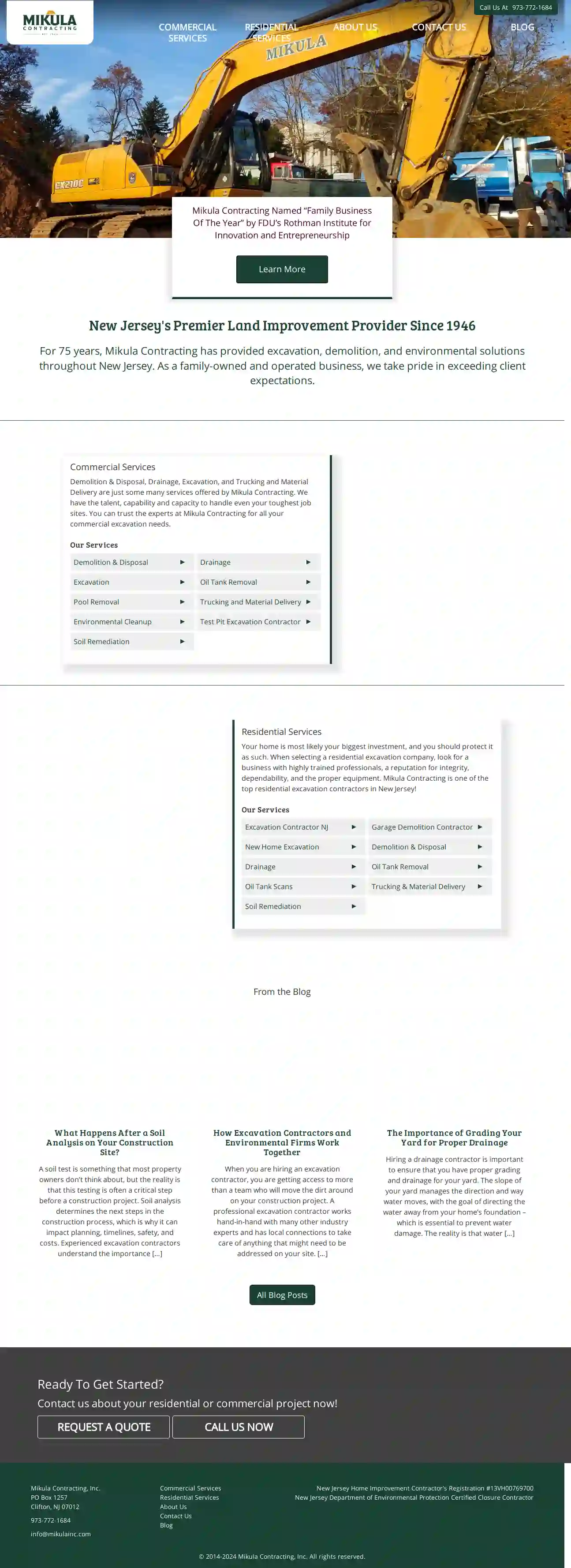
Mikula Contracting
4.855 reviewsPO Box 1257, Clifton, 07012, USAbout Mikula Contracting: A Family Owned and Operated Business Mikula Contracting, Inc., a family owned and operated business, has been servicing all of New Jersey for over 70 Years. We provide commercial and residential customers with a wide range of excavation, demolition, environmental, trucking and soil materials services. Our Founder, Nick Mikula Nick Mikula, Sr. first founded Nick Mikula Excavating with the purchase of a single dump truck in 1946. As the company expanded, it became a corporation in 1968. As a result, it was officially renamed Mikula Contracting, Inc. Nick’s son, Dennis Mikula, Sr., then assumed the leadership role of the company in the early 1980’s. During this time, the company managed to advance with the times and also increase production. All while maintaining the strong work ethic and integrity that Nick initiated. Throughout the years, Mikula Contracting has withstood the many challenges the volatile construction industry has faced, as a result of those values. The Next Generation Including several family members employed by Mikula Contracting, two of whom are Dennis’s sons, there is currently an average of over 13 years of Mikula Contracting service per worker and their experience combined is approaching 200 years. In addition to this extensive experience, each operator is also OSHA certified. It is important to note the extraordinary level of commitment and loyalty of each member of our staff. Their performance levels go above and beyond the standard, thus bettering our company. Trust Factors Mikula Contracting, Inc. is fully insured and certified throughout the state of New Jersey.
- Services
- Why Us?
- Accreditations
- Our Team
- Gallery
Get Quote
Premier Groundworks LLC
4.610 reviewsSouthfield, Michigan, USPremier Groundworks LLC Your trusted excavating contractor, hardscape installer, pond builder, and more! Call today to see what we can do for you. Serving all of Southeast Michigan. Premier Groundworks LLC offers beautiful commercial landscape design and other property maintenance and construction services throughout the Southeastern Michigan area. As a creative and professional commercial service, we handle build projects that include all aspects of industrial and commercial landscaping design, construction, plant installation, snow plowing, excavating and more. The commercial landscaping design experts at Premier Groundworks offer design and build services for many properties including: Residential community/Subdivision developments Parks and community centers Retail and office centers Health care facilities Religious organizations and institutions Municipalities Colleges and universities Small business complexes and many more. Commercial Excavating & Land Sculpting Premier Groundworks is a one-stop design-build company, specializing in sustainable and practical landscaping for commercial and residential projects. No matter the scope of excavating, or the property sculpting needs you require, Premier Groundworks can handle the task. We have the capabilities, experience, and creativity to exceed your expectations. Professional Commercial Landscaping Premier Groundworks plans and provides for successful completion of your commercial landscaping project through site analysis, budget proposals, and implementation. This is an essential key to a successful project.
- Services
- Why Us?
- Gallery
Get Quote
Cutting Edge Excavating
4.340 reviews5182 Chicago Dr, Hudsonville, 49426, USTHEN 2009 NOW 2023 Cutting Edge Excavating is a family-owned business founded in March 2009 by the Nykamp family, leveraging their 35 years of combined experience in the excavation industry. We began as a close-knit team of 6, driven by a shared commitment to delivering exceptional excavation services. Our dedication to growth and investment has allowed us to assemble a skilled team of 34 full-time employees. This expansion enables us to provide a comprehensive range of commercial, industrial, municipal, and residential excavation services. We own and operate a fleet of 19 local trucks, ensuring our team has the resources they need to efficiently complete projects of all sizes and complexities. This commitment to in-house equipment and personnel means we can provide our clients with greater control over project timelines and quality. In 2020, we faced a significant setback with a fire destroying our building. However, the unwavering determination of our team fueled a full recovery. We’re proud to call a brand-new facility our home, featuring a spacious 2-story, 9,000 square foot shop and office space, on the same property our old 7,800 square foot warehouse and storage facility stood, in Hudsonville, Michigan. At Cutting Edge Excavating, our mission remains clear: completing your projects on time, professionally, and at a fair price. We look forward to partnering with you on your next excavation project.. The Family
- Services
- Why Us?
- Our Team
- Gallery
Get Quote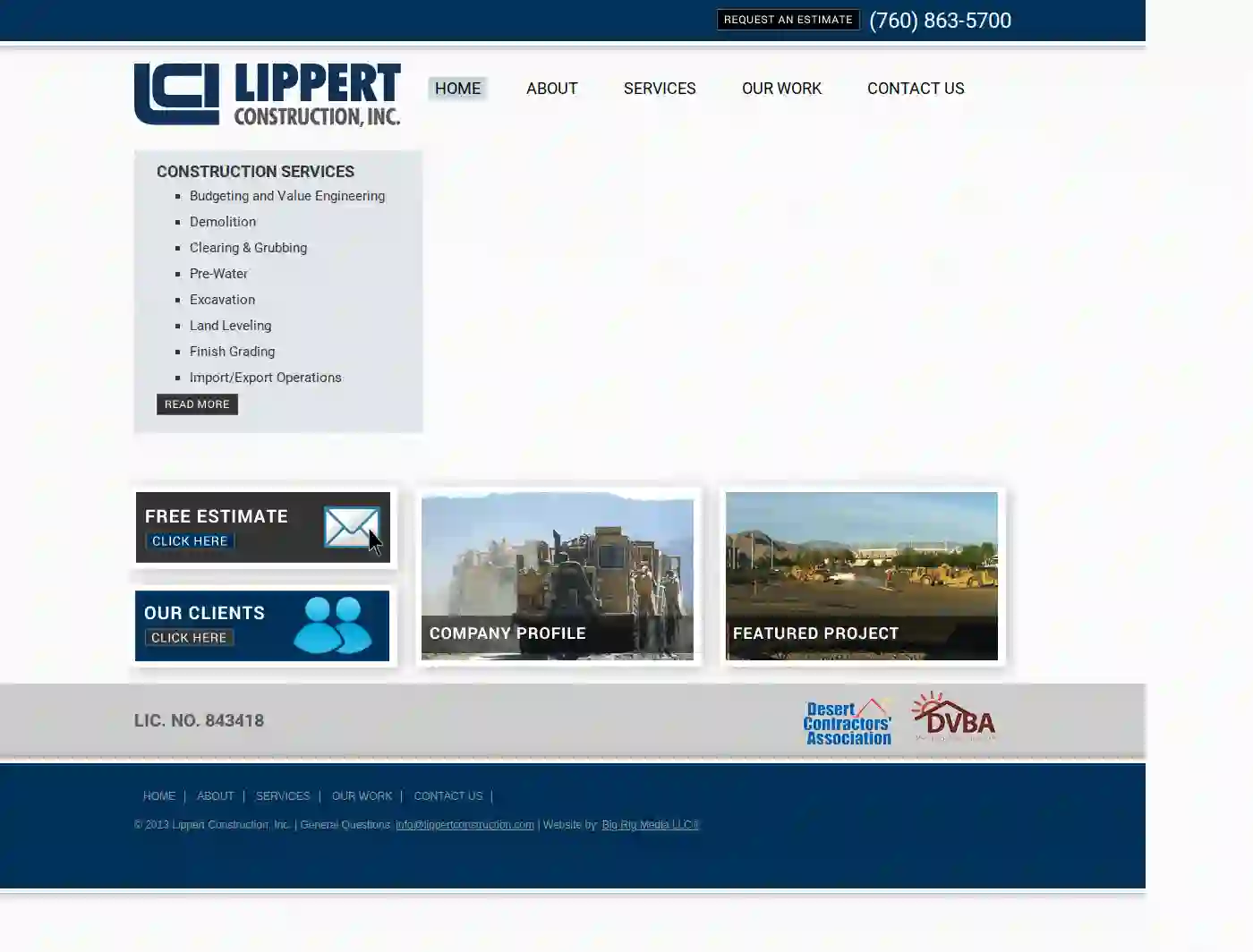
Lippert Construction
11 reviewsTroy, USLippert Construction: Your Trusted Partner for Construction Grading Lippert Construction, Inc. (LCI) is a leading provider of superior construction grading operations in the Coachella Valley. We have a proven track record of delivering high-quality results on time and within budget, earning us the trust of Southern California's premier builders and developers. Our commitment to safety is paramount. We are CPR, first aid, and AQMD certified, ensuring a secure and responsible work environment for our team and the community. With extensive experience in the Coachella Valley, we bring a deep understanding of the local landscape and regulations. Whether you need a single lot house pad, a commercial/retail center, or a large-scale subdivision or golf course project, LCI has the expertise and resources to handle any size job. We are dedicated to providing exceptional service and exceeding your expectations. Our team of skilled professionals is committed to delivering the highest quality workmanship and ensuring your project is completed to your exact specifications.
- Services
- Why Us?
- Gallery
Get Quote
Esper's Excavating LLC
510 reviews915 W. Beard Rd., 915 W Beard Rd, Perry, 48872, USEsper's Excavating: Your Trusted Partner for Excavation Services Esper's Excavating is a family-owned business deeply rooted in Perry, Michigan. We're dedicated to providing top-notch excavation services tailored to meet your specific needs. Our team boasts years of experience, ensuring efficient and effective project plans, whether you're a homeowner or a contractor. We take pride in our honest and professional approach, working closely with you to achieve your desired results. From small-scale projects to large-scale undertakings, we're equipped to handle it all. Our Expertise: Esper's Excavating offers a comprehensive range of services, including: Septic Systems & Perk Testing: We specialize in septic field installation, setting basic or engineered systems, and diagnosing minor repairs or providing system replacements. Septic risers and lid installation are also available. Sewer Line Repair & Replacement: We diagnose and repair city sewer lines, complete sewer pipe tie-ins, and connect to water systems. We work closely with local townships and cities to obtain necessary permits and inspections. Basements & Retaining Walls: We handle sand and gravel delivery for any project and can dig various basements, including walkouts, half walls, or crawl spaces. We ensure proper backfill, leaving the space clean and safe. Grading & Site Prep: We excel in soil removal, site development, drainage correction, and final grades. We collaborate with our customers to achieve the desired shaping for their project. Storm Water Systems: We create efficient systems to redirect water runoff from surfaces like sidewalks, roads, parking lots, or roofs. Land Clearing & Brush Hogging: We remove trees, shrubs, stumps, and debris, ensuring proper land balancing when needed. Driveways: We handle tiling, new driveway installations, and repairs. We can also deliver driveway material in a timely manner. Ponds: We dig farm ponds for wildlife habitats or your dream swimming pond. We also create diversion ponds for water separation or to dispose of standing water. Demolition & Leveling: We have experience demoing various structures, including barns, residential homes, and commercial buildings. We prepare the surface for construction, landscaping, or paving. About Us: Jon, the owner, is a licensed plumber pipe fitter with over a decade of experience. He works closely with local permitting departments. Growing up on a family farm, Jon has operated heavy machinery since childhood. His skills allow him to adapt to unexpected situations. Our knowledgeable and efficient operators are equipped to work in various environments, from tight residential spaces to open commercial areas. Esper's Excavating is fully licensed and insured. Work You'll Dig: Contact us for an estimate and let us help you bring your project to life.
- Services
- Why Us?
- Our Team
- Gallery
Get Quote
Hall's Trucking & Excavating
57 reviews13637 5 Mile Rd NE, Belding, 48809, USAbout Us We are a family owned and operated business! Denny Hall, owner, has been in the earth-moving business since 1995, and is fully licensed and insured for both Residential and Commercial work. We have company owned equipment which is well maintained. When choosing Hall's Trucking and Excavating, you can expect our great team to work hard on your behalf to get the job done! Our commitment to our customers is to maintain the highest level of quality and deliver cost efficient results without compromising service or safety! Contact Us Better yet, see us in person! We love our customers, so feel free to give us a call or email to set up a time to talk about your project.
- Services
- Why Us?
- Gallery
Get Quote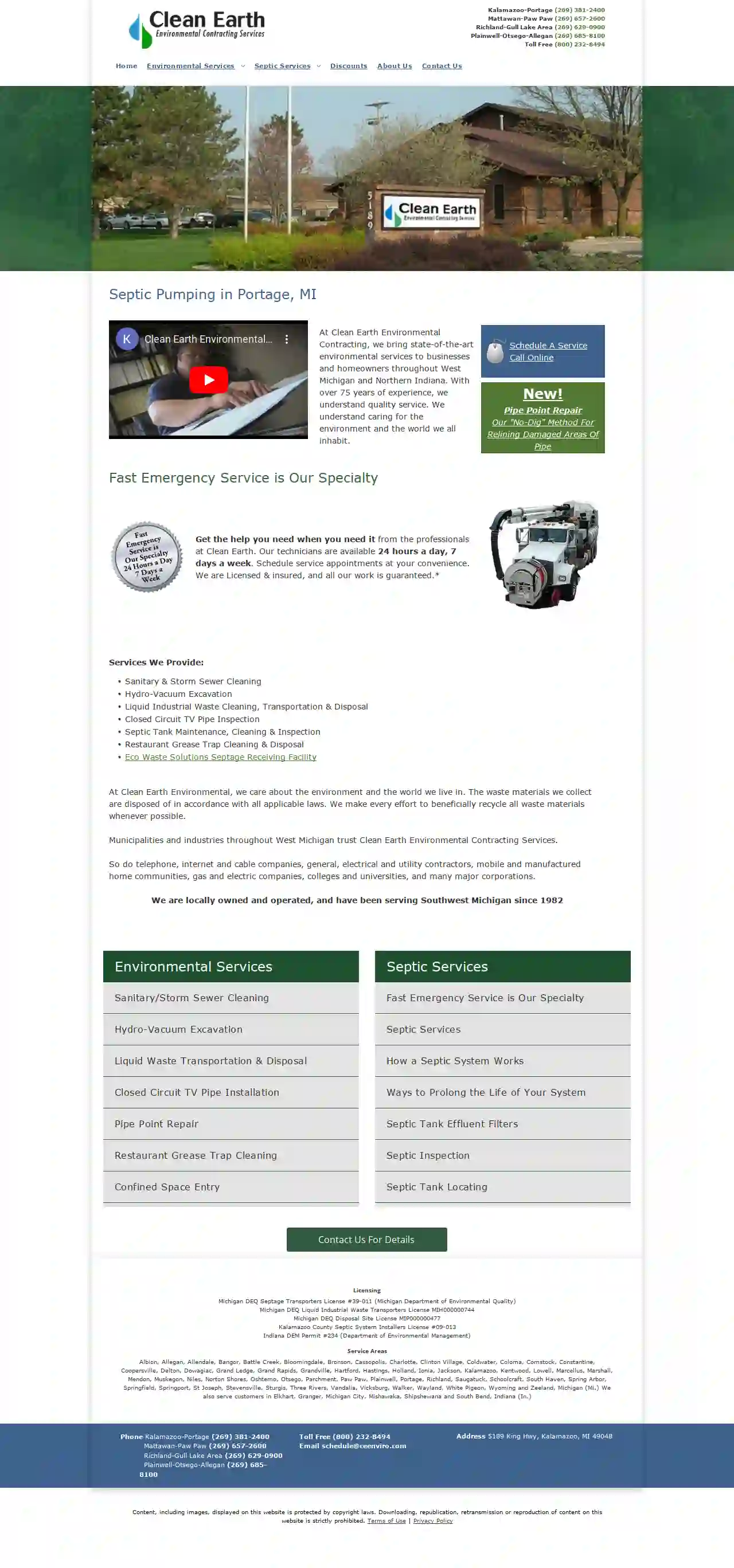
Clean Earth Environmental
55189 King Highway, Kalamazoo, 49048, USClean Earth Environmental Contracting Services At Clean Earth Environmental Contracting, we bring state-of-the-art environmental services to businesses and homeowners throughout West Michigan and Northern Indiana. With over 75 years of experience, we understand quality service. We understand caring for the environment and the world we all inhabit. Fast Emergency Service is Our Specialty Get the help you need when you need it from the professionals at Clean Earth. Our technicians are available 24 hours a day, 7 days a week. Schedule service appointments at your convenience. We are Licensed & insured, and all our work is guaranteed.* What We Do At Clean Earth Environmental, we care about the environment and the world we live in. The waste materials we collect are disposed of in accordance with all applicable laws. We make every effort to beneficially recycle all waste materials whenever possible. Who We Serve Municipalities and industries throughout West Michigan trust Clean Earth Environmental Contracting Services. So do telephone, internet and cable companies, general, electrical and utility contractors, mobile and manufactured home communities, gas and electric companies, colleges and universities, and many major corporations. Our History We are locally owned and operated, and have been serving Southwest Michigan since 1982. Testimonials "When our main lift station was inoperable, I called Clean Earth. With one phone call, my issues were resolved and a much bigger disaster was avoided. Clean Earth’s speedy response time eliminated the risk of contamination to the villages’ drinking water. Once again, we are pleased with the great job and your guys are always a pleasure to work with."– Ken, Village of Vicksburg "I appreciate our relationship with Clean Earth Environmental, as I can always depend on an immediate response. Your workers always go the extra mile to assure accuracy & efficiency and they always arrive on site with a positive attitude prepared for the task at hand. Clean Earth recognizes the importance of taking care of issues that have the potential to affect so many people if not handled rapidly. I have complete confidence in your staff. Thanks for a job well done!"- Bruce, Portage Public Schools
- Services
- Why Us?
- Accreditations
- Testimonials
- Gallery
Get Quote
Pater Bobcat Services Inc
4.317 reviews3613 24th Ave SW, Grandville, 49418, USGrand Rapids Excavation Services Trust the fully licensed and insured experts at Pater Bobcat Services to help your project get off to a great start with our proven excavation services. From complex installations and additions to minor touch ups, we offer all the excavation services you’ll need for your next project. Since 1999, commercial and residential contractors throughout West Michigan have trusted Pater Bobcat Services’ wide range of expertise. From concrete and asphalt pavement removal and prep to catch basin repairs and replacement, to pool demolition or materials delivery, Pater Bobcat Services will complete your project on time and on budget. Our team believes communication remains key when it comes to providing quality results. Trust our experienced professionals to stay in touch with you every step of the way as we implement your needs and pay attention to those little details that make a good project great. From your initial vision to a spotless site post-project, our team will dedicate their time to helping you achieve your project goals while caring for your property as if it was their own. In addition to a hardworking team, we believe it’s important to have quality materials for a project to be successful. From crushed concrete, screened and unscreened topsoil, stone, sand, bark and mulch, we offer a wide range of materials that can help you with just about any job, big or small. For more information about excavation services from the experts at Pater Bobcat Services, please contact us here or call us directly at 616.896.9778.
- Services
- Why Us?
- Testimonials
- Gallery
Get Quote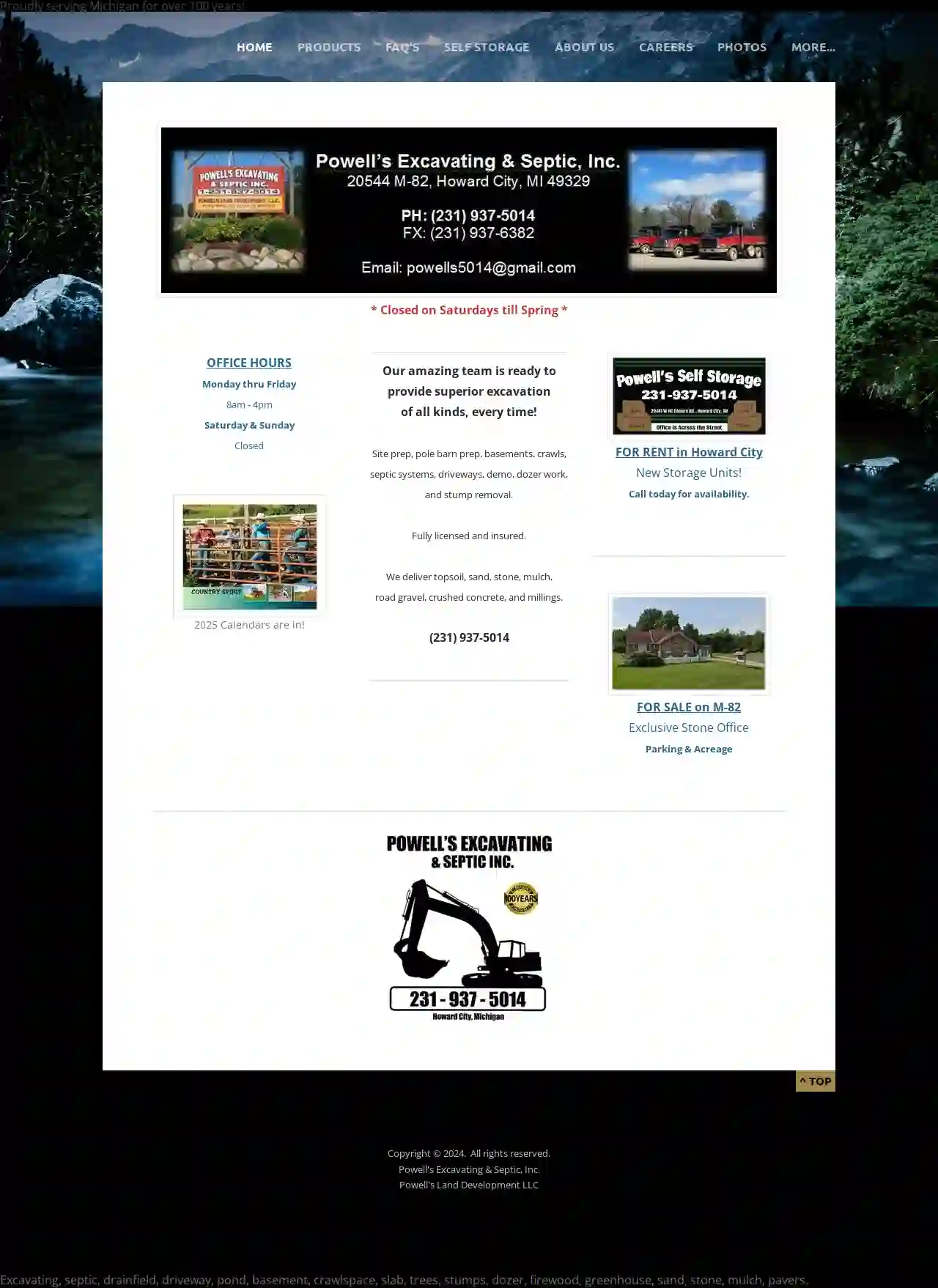
Powell's Excavating & Septic, Inc
4.667 reviews20544 M-82, Howard City, 49329, USPowell's Excavating & Septic, Inc.: A Legacy of Service in West Michigan For over 50 years, the Powell family has been a trusted name in West Michigan, providing high-quality excavation and septic services. It all began in 1968 with Ken Powell and a single backhoe, laying the foundation for a business built on hard work, integrity, and a commitment to customer satisfaction. Ken's dedication to his craft and his family's values instilled a strong work ethic in his sons. As the business grew, his sons, Dave, Ken, and John, each played a vital role in its success. John, with his natural talent for management, took the reins in 1986, ensuring the continuation of the Powell legacy. Today, Powell's Excavating & Septic, Inc. remains a family-owned and operated business, upholding the same high standards and Christian values that have earned them a reputation for excellence. We are proud to serve our community, providing reliable and professional services for all your excavation and septic needs. Whether you're planning a new construction project, need a septic system installed, or require any other excavation services, our team is here to help. We are committed to delivering exceptional results, exceeding your expectations, and building lasting relationships with our clients.
- Services
- Why Us?
- Gallery
Get Quote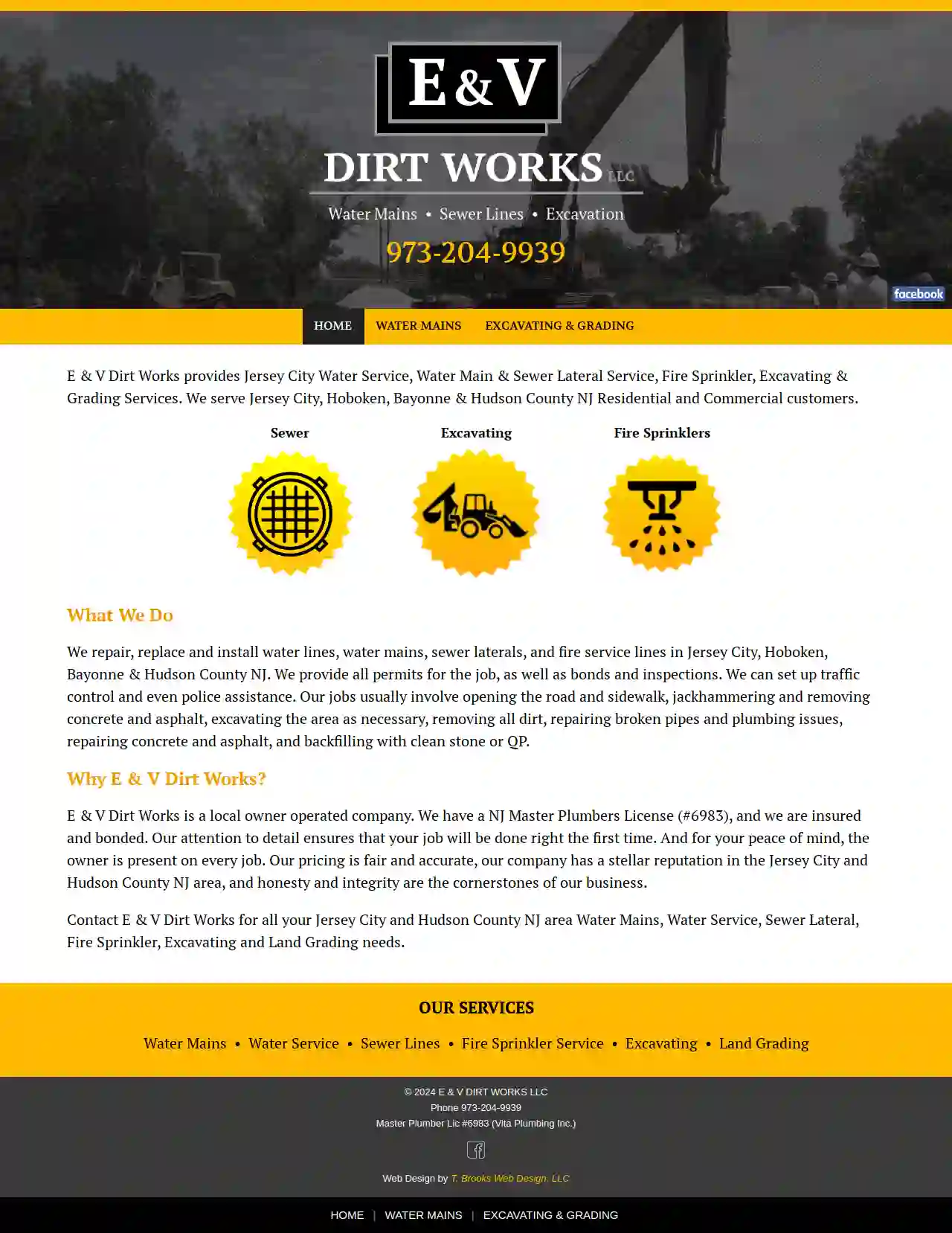
E & V Dirt Works LLC
53 reviewsWarren, USE & V Dirt Works: Your Trusted Partner for Water Mains, Sewer Lines, and Excavation in Jersey City and Hudson County NJ E & V Dirt Works is a locally owned and operated company dedicated to providing top-notch water main, sewer lateral, fire sprinkler, excavating, and grading services to residential and commercial customers in Jersey City, Hoboken, Bayonne, and throughout Hudson County NJ. We are committed to delivering exceptional service and exceeding your expectations with every project. Our team of experienced professionals holds a NJ Master Plumbers License (#6983) and is fully insured and bonded, ensuring your peace of mind. We take pride in our attention to detail, ensuring every job is completed to the highest standards. The owner is personally present on every project, guaranteeing quality and accountability. We understand the importance of timely and efficient service. We handle all aspects of your project, from obtaining permits and inspections to managing traffic control and even coordinating police assistance. Our comprehensive approach includes pre-planning, environmental protection, and thorough cleanup, leaving your site clean and ready for the next phase. At E & V Dirt Works, we are committed to honesty, integrity, and fair pricing. Our stellar reputation in the Jersey City and Hudson County NJ area speaks volumes about our dedication to customer satisfaction. Contact us today for all your water main, sewer lateral, fire sprinkler, excavating, and land grading needs.
- Services
- Why Us?
- Gallery
Get Quote
Over 22,076+ Excavation Contractors in our network
Our excavation companies operate in Lambertville & surroundings!
ExcavationHQ has curated and vetted Top Excavation Businesses arround Lambertville. Find the most reliable business today.
Frequently Asked Questions About Demolition Contractors
- General Liability Insurance: Covers bodily injury or property damage to third parties caused by the contractor's negligence.
- Workers' Compensation Insurance: Provides benefits to workers injured on the job.
- Pollution Liability Insurance: Covers costs associated with environmental contamination caused by demolition activities.
- Professional Liability Insurance: Protects against claims of negligence or errors in professional services, such as demolition planning or consulting.
- Project Assessment: The demolition contractor evaluates the structure, site conditions, and project requirements.
- Permitting: Obtain necessary demolition permits from local authorities.
- Site Preparation: Secure the site, disconnect utilities, and remove any valuable or reusable items.
- Hazardous Material Abatement: Professionally remove asbestos, lead paint, or other hazardous materials if present.
- Demolition: Execute the chosen demolition method, bringing down the structure safely and efficiently.
- Debris Removal and Site Cleanup: Sort, process, and dispose of demolition debris responsibly. Clean up the site to prepare it for future use.
- Recycling: Concrete, brick, metal, and wood can be recycled and reused in other construction projects, reducing waste sent to landfills.
- Landfill Disposal: Non-recyclable materials are disposed of in designated landfills according to local regulations.
- Donation: Some materials, such as fixtures or appliances, may be suitable for donation to charitable organizations.
What is the importance of insurance in demolition projects?
What are the steps involved in a typical demolition process?
What happens to the debris after demolition?
Can I do demolition myself?
What is the importance of insurance in demolition projects?
- General Liability Insurance: Covers bodily injury or property damage to third parties caused by the contractor's negligence.
- Workers' Compensation Insurance: Provides benefits to workers injured on the job.
- Pollution Liability Insurance: Covers costs associated with environmental contamination caused by demolition activities.
- Professional Liability Insurance: Protects against claims of negligence or errors in professional services, such as demolition planning or consulting.
What are the steps involved in a typical demolition process?
- Project Assessment: The demolition contractor evaluates the structure, site conditions, and project requirements.
- Permitting: Obtain necessary demolition permits from local authorities.
- Site Preparation: Secure the site, disconnect utilities, and remove any valuable or reusable items.
- Hazardous Material Abatement: Professionally remove asbestos, lead paint, or other hazardous materials if present.
- Demolition: Execute the chosen demolition method, bringing down the structure safely and efficiently.
- Debris Removal and Site Cleanup: Sort, process, and dispose of demolition debris responsibly. Clean up the site to prepare it for future use.
What happens to the debris after demolition?
- Recycling: Concrete, brick, metal, and wood can be recycled and reused in other construction projects, reducing waste sent to landfills.
- Landfill Disposal: Non-recyclable materials are disposed of in designated landfills according to local regulations.
- Donation: Some materials, such as fixtures or appliances, may be suitable for donation to charitable organizations.
